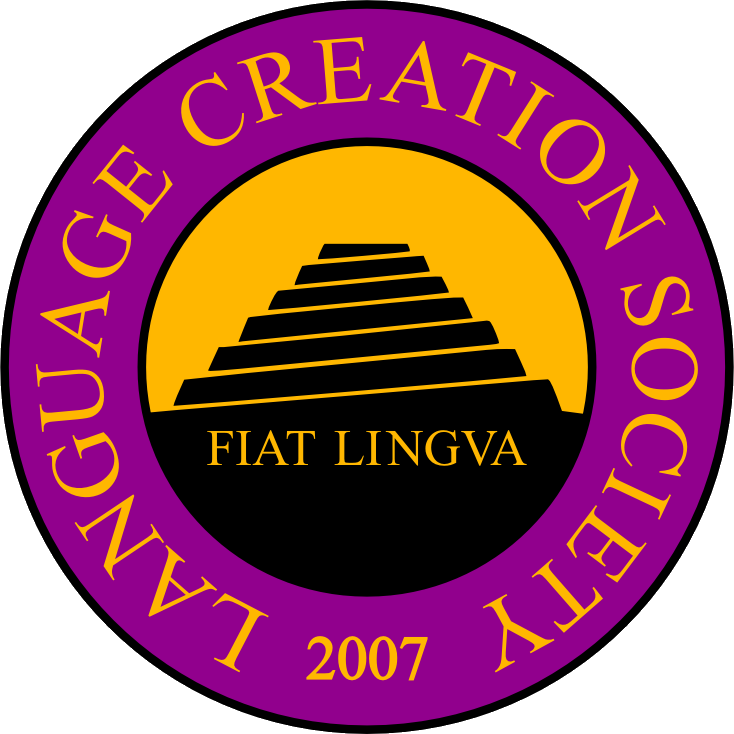The Sixth Language Creation Conference
- Speakers/presenters
- Schedule & slides
- Relay
- Video: Saturday part 1 – Saturday part 2 – Sunday
- IRC chat transcript (PDF, TXT)
- Mailing list
About the LCC
The Conference is a set of talks and panel discussions about various issues related to language creation, from several different perspectives. It includes both fairly academic linguistic discussions as well as more general sociological ones; voices from many parts of the conlanging community; and people from all over America. The conference is open to the public; preregistration requested. Lunch and snacks will be provided.
What Is Language Creation?
Language creation (or “conlanging”—”conlang” is short for “constructed language”) is the process of inventing and (usually) describing a new language. Though the extent to which a language is created varies, creators might include sound systems, grammars, and writing systems for their languages. Some creators are also interested in cosmogenesis: the creation of cultures and worlds in which their languages are used.
What’s the Point?
People create constructed languages for a number of reasons. Artistic languages are often included in fictional works: for example, Tolkien’s Quenya in The Lord of the Rings or Klingon in Star Trek. International auxiliary languages (auxlangs) are intended for communication between people of different native languages, usually to prevent one being elevated over others or to making learning easier; some famous examples are Esperanto, Ido, and Interlingua. Logical and philosophical languages are used to test linguistic (and other) theories; Loglan and Lojban are well-known examples of the former, and Suzette Haden Elgin’s Láadan is an example of the latter — which she incorporated into the Native Tongue series of novels.
Conference Program
Please see the list of speakers and the schedule of events.
In addition, Britton Watkins filmed part of the LCC and interviewed conlangers on camera. Let him know if you are interested in being interviewed.
In 2013-2014 Britton Watkins and his husband, Josh Feldman, made the sci-fi feature film, Senn (sennition.com), which features the constructed language Siinyamda. As of the early Spring of 2015 Britton is exploring making a feature length documentary on CONLANGING and the broad world of con-scripting (orthographies) and constructed artifacts that go hand in hand with it back to Hildegard von Bingen and through to the word “conlang” being included in the OED as of June of last year. Britton will seek to interview conlangers and show and discuss their creations on screen in a film that is interesting not only to the global conlanging community, but to a broader audience who enjoys learning about all types of creativity in our world. Britton wants to celebrate conlanging as something that figures heavily into his daily landscape of intellectual pursuits and social interactions. When completed, he will seek to have this film shown in film festivals and to be available on global content distribution networks.
Code of Conduct
The LCS expects all attendees to abide by the LCC Code of Conduct:
The Language Creation Society is dedicated to providing a harassment-free conference experience for everyone, regardless of gender, gender identity and expression, sexual orientation, disability, physical appearance, body size, race, religion, or conlanging preferences (and not limited to those aspects). We do not tolerate harassment of conference participants in any form. Gratuitous violent or sexual language and imagery is not appropriate for any conference venue, including talks.
To report harassment, please contact any of the LCC staff. Conference participants violating these rules may be sanctioned or expelled from the conference without a refund at the discretion of the conference organizers.
Harassment includes but is not limited to offensive verbal comments related to gender, sexual orientation, gender identity or expression, disability, physical appearance, body size, race, ethnicity, political affiliation, or religion. Harassment also includes violent or sexual images in public spaces, deliberate intimidation, stalking, unwelcome following, harassing photography or recording, sustained disruption of talks or other events, inappropriate physical contact, and unwelcome sexual attention. Participants asked to stop any harassing behavior are expected to comply immediately.
If a participant engages in harassing behavior, the conference organizers may take any action they deem appropriate, including warning the offender or expulsion from the conference. If you are being harassed, notice that someone else is being harassed, or have any other concerns, please contact a member of conference staff immediately.
Conference staff will be happy to help participants contact hotel/venue security or local law enforcement, provide escorts, or otherwise assist those experiencing harassment to feel safe for the duration of the conference. We value your attendance.
We expect participants to follow these rules at all conference venues and conference-related social events.
